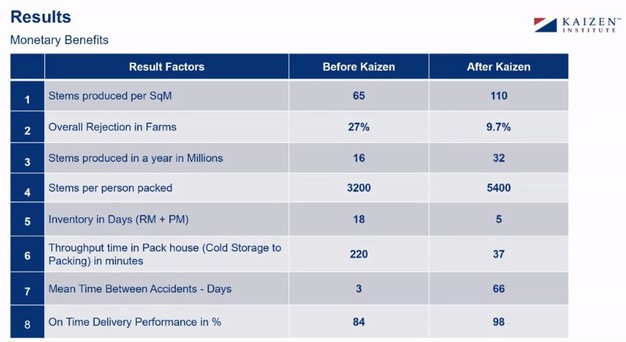How to improve by utilizing what you have? That's the principle of Japanese "Kaizen", which literally means change for the better and is also referred to as continual improvement. It is a culture that has been implemented by several farms in Kenya already (for example at Rift Valley Roses and Marginpar) and last week, Jayanth Murthy, Joint Managing Director at Kaizen institute, gave more inside information about the importance of it, how to achieve it and to sustain in the webinar Cut Waste Not Cost - Kenya Flower Council Edition, organized together with UMA (Uganda Manufactures Association).
Creating Immunity
A strong immunity isn't only essential for a person's health, it is also for the company's health, explains Murthy. But why creating immunity? "If you are lean and fit, you are better resistant to virus or any attacks or viruses from outside. Also companies always have to deal with new challenges, natural disasters, social disasters and now with COVID-19 for example. While the Corona virus does not affect everyone in the same way, similarly the impact of COVID 19 on businesses will not be the same. We cannot wish away the problems, but we can protect ourselves and we can do this by building immunity. And for a company, Kaizen is building immunity, not a vaccine. All those people who invested in building in this immunity will probably survive better than those people who were careless and reckless, who will suffer more."
Culture
Kaizen is a culture and this culture is created when you follow three things, explains Murthy: "Everyday you are doing improvements, you do it by engaging Everyone and you are doing it Everywhere, in all aspects of your business."
He often sees companies who are willing to and also actually implement improvements, but not on a continual basis. In turn not culture is being built then. "Many do improvements someday, someone and somewhere. This often occurs when there is a client's complaint, for example, then all of a sudden improvements need to be made. Then, usually just some men are talking about improvement and the rest are not talking in the same language. So, how can you have a culture without sharing the same language?"
"Kaizen is a way of thinking, a culture and a mentality and it includes both, thinking and acting. Understanding only the theory of Kaizen is not enough."
Delete, delete, delete
Why Kaizen? "If you keep improving on a daily basis, your organization becomes fit. And the opposite of fit is fat, so, which of the two has a better chance of being in good health?"
So, a company needs to become fit. Murthy explains that there are two ways to improve, by adding and by deletion. The first will involve a lot of costs while the latter involves different thinking. "When comparing it with weight loss of a person, we first need to look at what we would like to lose; fat and no muscles. So in a company, what do we need to delete? We need to delete waste, variation and excess burden (Muda, Mura and Mudi, in Japanese). Then if we deleted this, the company will run smoother, will become more flexible, the freshness of the product improves, the complexity of the business goes down as well as the costs per ha and so on. However, if we lost this weight, the next worry is to not gain it back. Here, daily management and the role of the supervisors come in.
Results at growers
Kaizen will not only make ones company immune for any attacks or challenges in the future, it also proves to have a positive outcome on many other aspects. For example, the number of stems per m2 increases, the overall rejection in farms decreases, the amount of stems per person packed increases, the throughput time in pack house decreases and the mean time between accidents increases.

Click here for the enlarged version.
Kaizen Institute
Kaizen Institute operates in 50 countries and has an office and many members in Kenya. They started about 35 years ago in Japan and have a local presence in Africa, for about 20 years now. They consult all kind of companies and started consulting and training at their first Kenyan farm, East African Growers, about 18 years ago and many others followed afterwards, like Fontana, Homegrow, Finlays, Kariki, Marginpar and Vegpro. "We do not know anything about the product or production but we can tell the companies how to become faster, better and cheaper. We bring our wide variety of experience to the company, that we will visit often during the process." What they do is very practical. "Kaizen is all about going to the 'real place'."
For more information
Kaizen Institute
Jayanth Murthy
Email: jmurthy@kaizen.com
www.kaizen.com
